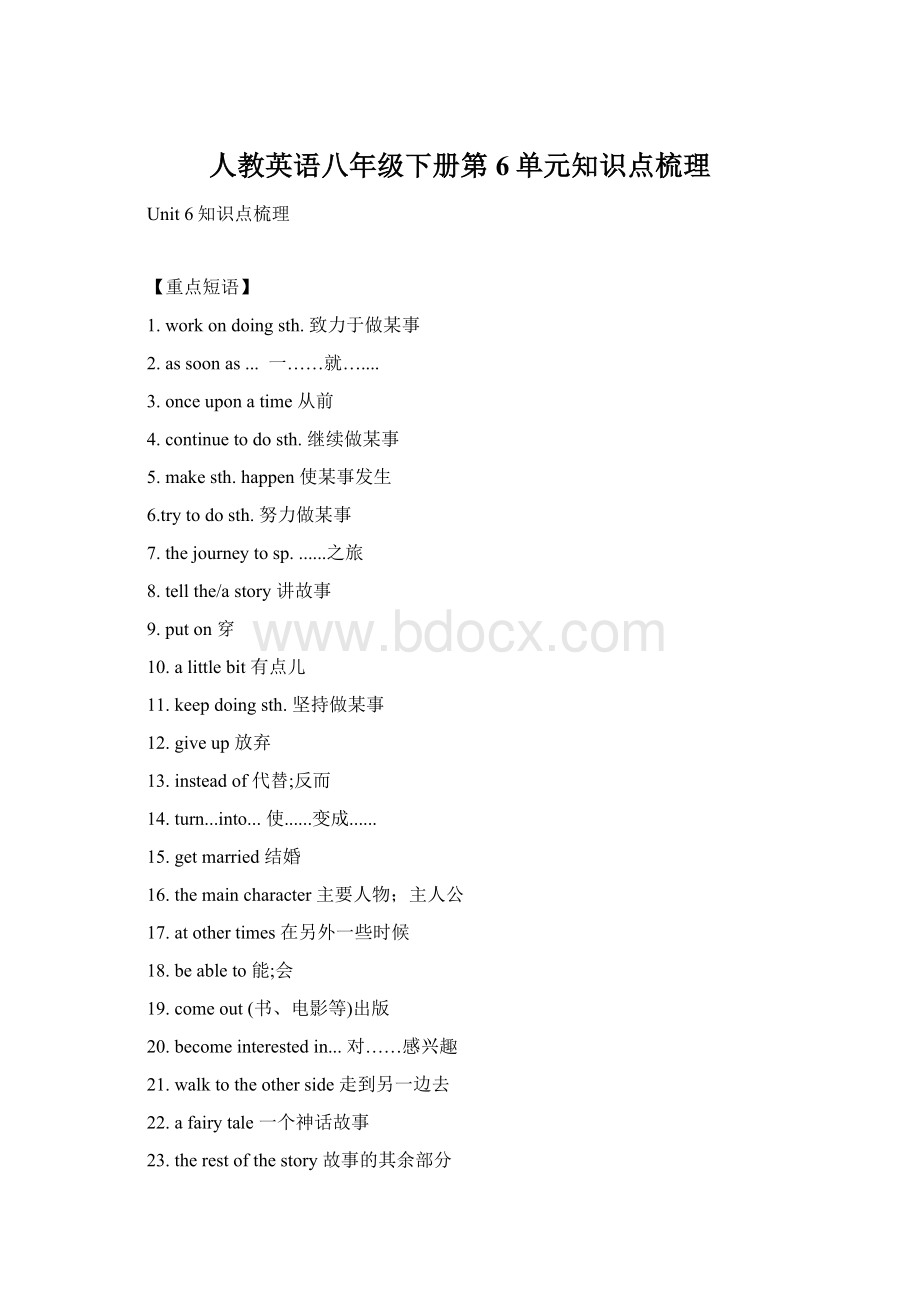人教英语八年级下册第6单元知识点梳理.docx
《人教英语八年级下册第6单元知识点梳理.docx》由会员分享,可在线阅读,更多相关《人教英语八年级下册第6单元知识点梳理.docx(12页珍藏版)》请在冰豆网上搜索。

人教英语八年级下册第6单元知识点梳理
Unit6知识点梳理
【重点短语】
1.workondoingsth.致力于做某事
2.assoonas... 一……就…....
3.onceuponatime从前
4.continuetodosth.继续做某事
5.makesth.happen使某事发生
6.trytodosth.努力做某事
7.thejourneytosp.......之旅
8.tellthe/astory讲故事
9.puton穿
10.alittlebit有点儿
11.keepdoingsth.坚持做某事
12.giveup放弃
13.insteadof代替;反而
14.turn...into...使......变成......
15.getmarried结婚
16.themaincharacter主要人物;主人公
17.atothertimes在另外一些时候
18.beableto能;会
19.comeout(书、电影等)出版
20.becomeinterestedin...对……感兴趣
21.walktotheotherside走到另一边去
22.afairytale一个神话故事
23.therestofthestory故事的其余部分
24.leavesb.todosth.让某人做某事
25.makeaplantodosth.筹划/计划做某事
26.gotosleep去睡觉
27.leadsb.tosp.把某人领到某地
28.getlost迷路
29.changeone’splan改变计划
30.tellsb.todosth.叫某人做某事
31.inthemoonlight在月光下
32.findone’swayhome找到某人回家的路
33.thenextday第二天
34.sendsb.tosp.派某人去某地
35.so...that...如此.......以致于.......
【重点句型】
1.SowhatdoyouthinkaboutthestoryofYuGong?
你觉得愚公的故事怎么样?
2.Itdoesn’tseemverypossibletomoveamountain.把一座山给移掉好像不太可能。
3.Thisisbecausehecanmake72changestohisshapeandsize,turninghimselfintodifferentanimalsandobjects.这是因为他会根据他的形状和大小,做出72种变化,可以将自己变成不同的动物或东西。
4.Sometimeshecanmakethesticksosmallthathecankeepitinhisear.有时候,他能够让他的金箍棒变得很小,以至于可以放在耳朵里。
5.Becausetheyweresobigthatittookalongtimetowalktotheotherside.这些(山)太高了,他们要花好长时间才能翻越过去。
6.Don’teatituntilyougettotheforest.你们到达森林之后才能吃。
【话题写作】
同学们对“愚公移山”的故事一定有着很深的印象吧?
请根据本单元所学内容及下面的提示词语,以ThestoryofYuGong为题,把“愚公移山”的故事用英语简要叙述一下,并谈一谈你从故事中学到了什么。
80词左右,开头已给出,不计入总词数。
提示词语:
90,movethemountains,zhisou,die,sons,grandsons,continue,god,bemoved,help
【优秀满分范文】
ThestoryofYuGong
Onceuponatime,therewasanoldmancalledYuGong.Althoughhewasalmost90,hedecidedtomovethemountains.
AclevermancalledZhisousaid,“youaretoooldtomovethemountains.”Yugongsaid,“IfIdie,mysonsstilldothis,andifmysonsdie,mygrandsonscontinuedoingthis.”thenagodwasmovedbyYugong,sohesenttwogodstohelphim.
Fromthisstory,Ilearnthatanythingispossibleifweworkhard.
词汇讲解
1.miss
miss作动词,意为“想念,思念”。
例如:
I’llmissyouwhenyougotoCanada.
你到了加拿大以后,我一定会想你。
【拓展】
(1)miss作动词还有“未击中,未抓住”的意思。
例如:
ItriedtohittheballbutImissed.
我努力地想击中球,但却未成功。
(2)miss还可意为“未赶上,错过”,是动词。
例如:
ImissedthefootballmatchonTVlastnight.
我错过了昨天晚上电视中的足球赛。
(3)miss与like;mind;finish;enjoy;practice;bebusy;stop;can’thelp;giveup等词一样后接动词的-ing形式。
例如:
Idon’twanttomissseeingthatfilmontelevisiontonight.
我不想错过今晚在电视上看那部影片的机会。
2.suddenly
suddenly作副词,意为“突然,忽然”,在句中多修饰动词或句子,做状语。
例如:
IsuddenlyrememberedthatIdidn’tbringmykey.
我突然想起来我没有带钥匙。
Itallhappenedsosuddenly.
一切都发生得那么突然。
3.either
(1)either作副词,意为“也不”,用在否定句中。
例如:
Hecan’tplaytheviolin.Ican’t,either.
他不会拉小提琴,我也不会。
(2)eitherpron.(两者中)任意一个。
例如:
Therearemanytreesoneithersideofthestreet.
在街道的每一边都有很多树。
(3)either…or…为连词短语,连接两个相同的句子成分,意为“要么……要么……;或者……或者……;不是……就是……”。
例如:
Heeitherstaysathomeorvisitsfriendsontheweekend.
在周末,他要么待在家里,要么拜访朋友。
Theywillcomeeithertomorroworthedayaftertomorrow.
他们不是明天来,就是后天来。
【注意】
either…or…连接两个主语时,谓语动词的形式与紧靠谓语的那个主语的形式保持一致,即遵循就近原则。
例如:
EitherIorheisondutytoday.
今天不是我值日,就是他值日。
4.light
(1)light作不可数名词,意为“光;光亮;光线”。
例如:
Thesungivesoutlightandheat.
太阳发出光和热。
Hereadtheletterbythelightofthecandle.
他在烛光下读那封信。
(2)light作可数名词,意为“电灯;光源”。
例如;
Don’tcrosstheroadwhenthetrafficlightsarered.
当交通灯是红色时,不要横穿马路。
(3)light作形容词,意为“轻的;浅色的”。
例如:
Istheboxheavyorlight?
那箱子是重还是轻?
Ilikethelightgreendress.
我喜欢哪件浅绿色的裙子。
(4)light作动词,意为“点燃;照亮”。
例如:
Hesatdownandlitacigarette.
他坐下来,点了一支烟。
5.beat
beat是及物动词,有以下用法:
(1)意为“赢;打败;战胜”,后接人或某一团队、组织等,其过去式为beat。
例如:
Ibeathimatlongjumpyesterday.
昨天跳远我赢了他。
(2)意为“打;击”,表示连续不断的打击。
例如:
Whoisbeatingthedrum?
谁在打鼓?
(3)表示“(心脏)等跳动”。
例如:
Ifeelmyheartisbeatingfast.
我觉得我的心脏在剧烈跳动。
【拓展】
beat和win都有“赢”的意思,但用法不同:
beat的宾语为人或相当于人的团体、组织;而win的宾语为比赛或某个项目,过去式为won。
例如:
Thoughwewereweak,webeatthem.
虽然我们弱,但我们赢了他们。
Whowonthefirstprizeinthecompetition?
谁在比赛中赢得了一等奖?
6.against
against是介词,其用法如下:
(1) 反对,违反。
对应的反义词为for,常用于beagainstsb./sth.反对某人/某事例如:
Aremostpeopleagainsthavingapart-timejob?
大多数人反对做兼职工作吗?
(2)和……交战(指竞争、比赛等)。
例如:
We’llhaveabasketballmatchagainsttheteamfromNo.2MiddleSchoolnextweek.
下星期我们将于二中的球队举行一场篮球赛。
(3)碰、撞、擦。
例如:
Rainbeatsagainstthewindow.雨打在窗户上。
(4)倚着、靠着。
例如:
Therewasaladderproppedup(支撑)againstthewall.
一把梯子靠着墙。
(5)防备,抗……。
例如:
Shesavedmoneyagainstoldage.她攒钱防老。
(6)逆着……。
例如:
Wearesailingagainstthewind.我们(的船)正逆风航行。
(7)衬托,相映,对照。
例如:
Redflagsstandoutbrightlyagainstthebluesky.
红旗在蓝天的衬托下显得分外鲜艳。
7.try
try作动词,意为“尝试,努力”。
主要用法如下:
(1)trytodosth.意为“设法去做某事,尽量去做某事”,其否定形式为trynottodosth.。
例如:
Trynottobelateagain.
尽量别再迟到了。
Trytogethereintwohours.
尽量在两小时之内到达。
(2)trydoingsth.意为“试着做某事”,强调尝试做某事。
例如:
Youshouldtryeatingmorevegetables.
你应当试着多吃点蔬菜。
(3)tryone’sbesttodosth.意为“尽某人最大努力做某事”。
例如:
Weshouldtryourbesttofinishtheworkontime.
我们应该尽最大努力准时完成这项工作。
8.hard/hardly
hardly和hard形式上很接近,但意义截然不同。
(1)hard作形容词时,意为“困难的;硬的;勤奋的;严厉的;苛刻的”。
hard作副词时常用来表示程度,意为“努力地;猛烈地;剧烈地”。
例如:
Iworkhardatschool.我在学校努力学习。
Thisgroundistoohardtodig.这块地太硬,挖不动。
Theytriedhardtosucceed.他们努力工作,以求得成功。
【拓展】
workhardat…意为“努力于……”。
例如:
HeisworkinghardatEnglish.他正在努力学习英语。
(2)hardly是表频率的副词,意为“几乎不;几乎没有”,相当于almostnot,并非hard的副词形式。
例如:
Thereishardlyanycoffeeleft.
=There’salmostnocoffeeleft.
几乎没有剩余的咖啡了。
练一练:
I.英汉短语互译。
1.沉默;无声________ 2.remembertodo________
3.首先;最初________ 4.havefundoingsth.________
5.感觉;好像________ 6.ontheplayground________
7.(闹钟)发出响声_______8.reportsth.tosb.________
9.逐渐变弱、消失________10.fallasleep_____________
II.根据句意和首字母提示完成单词。
1.Maybetherewillbeathunder________(暴风雨).
2.Mymind________(突然)switchedbacktomyconversationwithJeremy.
3.Thesmokertossedawaythelighted________(火柴)andsocausedafire.
4.Ican’treadwhileyouarestandinginmy________(光线).
5.Itwas_______(报道)thattherewasgoingtobeafootballmatch.
6.Thefarmisabout50or60squarekilometersinthe________(地区).
7.Youshouldflyyourkitea________thewind.
8.Itrainedso________(大)lastnightthatthelakeisfullofwaternow.
9.Johnwasverytired.Hesoonfella________.
10.Ijustwanttob________thisbadguy.
III.用括号内所给词的适当形式填空。
1.Iguessfromhisredeyesthathehasbeenworkingtoo_____(hard)recently.
2.Pleaseremember_______(clean)theroomafterwork.
3.Wishyouhavefun_______(learn)Englishthisterm.
4.—Whydidn’tyouattendyesterday’spresentation?
—Sorry,I________(wait)foranimportantEMSthenfromaneditor.
5.Almosteveryoneknowsthatthemoon________(rise)intheeast.
重点句型解析
1.Whenhewokeup,thesunwasrising.
wasrising意为“正在升起”,为过去进行时态,该时态表示在过去某时间某动作正在发生,由“助动词was/were+doing”构成。
例如:
Theywereplayinginthepark.
他们正在公园里玩。
ShewasreadingabookwhenIcamein.
我进来时她正在看书。
2.Butluckily,thedriverwasfine.
luckily作副词,意为“幸运地;幸亏”,做状语。
例如:
Luckily,shefoundmybook.
幸运的是,她找到了我的书。
Luckily,wecaughtthelasttrain.
很幸运,我们搭上了末班火车。
【拓展】
(1)lucky作形容词,意为“幸运的;有好运的”。
例如:
Somepeopleseemtobealwayslucky.
有些人似乎总是很幸运。
Nineismyluckynumber.
9是我的幸运数字。
(2)luck作不可数名词,意为“好运;幸运;运气”。
例如:
Ihopeitwillbringyouluck.
我希望它会给你带来好运。
Goodlucktoyou!
祝你好运!
3.Theroadswereicy…
icy作形容词,意为“结冰的;冰冷的;冷淡的”。
例如:
It’snoteasytowalkontheicyroads.
在结冰的路面上行走不容易。
Becauseoftheicystreet,theycan’tdrivethecar.
因为街上结满了冰,他们不能开车。
Mostpeopledon’twanttoswimintheicywater.
大多数人都不想在冰冷的水里游泳。
【拓展】
ice作不可数名词,意为“冰”。
例如:
Theiceisthickenoughtoskateon.
这冰够厚的,可以在上面滑冰。
Theboyisn’tafraidofcold.Heisholdingapieceofice.
这个男孩不怕冷,手里握着一块冰。
4.ButwhenIpointeditouttomyfriend…
pointout意为“指出”,是“动词+副词”结构,人称代词作宾语时应放在动词之后、副词之前。
例如:
Thereisamistakeinthissentence.Canyoupointitout?
这个句子有一处错误,你能把它指出来吗?
Hepointedoutthewomanfromthesephotos.
他从这些照片中指出了那个女子。
【拓展】
(1)point作不及物动词,意为“指;指向”,常与介词at,to,towards等连用,表示“指向某位置或方向”。
例如:
Shepointedatme,laughing.
她指着我笑。
(2)point作可数名词,意为“点;要点”。
例如:
Let’sdiscussthedifficultpointsinthepassage.
让我们讨论一下文中的难点。
5.Whydidyoucallsomanytimes?
somany意为“那么多”,修饰复数名词,例如:
Hehassomanyfriends.
他有那么多的朋友。
Therearesomanypeopleintheexhibition.
展览会上有那么多人。
练一练:
I.句型转换,按要求完成下列句子。
1.Theoldmancouldn’tfindanywheretolive.(改为同义句)
Theoldmancould_______________tolive.
2.MotherwascookingwhileIwasdoingmyhomework.(对画线部分提问)
________________yourmother________whileyouweredoingyourhomework?
3.Lilywasreadingintheroomatthattime(改为一般疑问句)
________Lily________intheroomatthattime?
4.Iwassleepingatninelastnight.Lindawasdoingherhomeworkatninelastnight.(用while将句子合并为一句)
I________________________Linda________________herhomeworkatninelastnight.
5.Don’tforgettolockthedoorbeforeyouleave.(改为同义句)
____________________thedoorbeforeyouleave.
II.根据汉语提示,完成句子。
1.这时,我要做的只是默默地服从他。
AllIhadtodonowwastoobeyhim______________.
2.天在下雨,记着随身携带你的雨衣。
It’sraining.__________________yourraincoatwithyou.